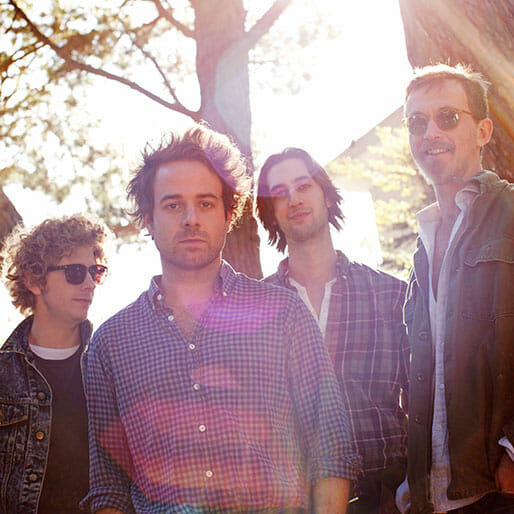Dawes: Identity Crisis

Some musicians reach a point where a writer can describe their music by simply identifying them by name. It might seem lazy on the surface to say that Led Zeppelin sounds like Led Zeppelin, or that James Taylor sounds like James Taylor, but the ability to do so says something about the artist, not in terms of quality, but in terms of identity. And when this happens, the conversation starts drifting away from what shaped their voice and turns to how the artist is progressing.
Dawes’ Taylor Goldsmith calls this “the dream of any band.” So, the fact that advanced writing on his band’s third album, Stories Don’t End, has claimed that Dawes is trying to modernize their sound and step away from their ‘70s Laurel Canyon folk-rock label fires up the songwriter before he has even been asked a question.
“It’s not like I want to dictate how you receive our music through a preconceived introduction,” claims Goldsmith, seemingly frustrated by having to explain their recent “preconceived introduction” to an unnamed number of journalists over the past months. “It’s up to the listener. The reality is our influences are what they are. If we sound like Steely Dan, then we sound like Steely Dan. If we sound like Warren Zevon and Little Feet and The Band or whoever, those are important bands to us, so good. I wasn’t trying to say ‘now we’re a modern band so please consider us in the same esteem as the artists that we do consider our contemporaries,’ like Bon Iver or Grizzly Bear.”
“We just want to have our own identity,” Goldsmith adds, “and that’s up to us. “
This reaction from Goldsmith is comforting, as it is difficult to view Stories Don’t End through the lens of Dawes sounding more contemporary. While there are more harmonies that sound similar to what Fleet Foxes have made more common, this element found on “Just Beneath the Surface” and “Side Effects” hardly constitutes a reinvention, but more a natural evolution, a journey that Goldsmith, along with his brother Griffin, bassist Wylie Gelber and recently added keyboardist Tay Strathairn, have been on since the breakup of their previous band, Simon Dawes.
“I do think that this album more than the other two is a step towards our goal,” he claims. “Not necessarily toward modern or contemporary things, but a step towards us feeling proud of an identity.”
“It’s always been a constant progression and direction,” explains Goldsmith. “Songs on North Hills like ‘Bedside Manner’ and ‘Peace in the Valley’ were Simon Dawes songs before we broke up. But since we began writing songs, there has been that question of what is the most representative of us as players and me as a writer. It’s never been us saying ‘let’s try this, let’s try that.’ It’s always been what feels best to us, and what makes us happiest. I think if Simon Dawes were still together, you’d see a similar arc.”
That arc found the group leaving Los Angeles to set up shop for five weeks in Asheville, N.C. with producer Jacquire King. Goldsmith liked the idea of leaving home to record without distractions, though he notes it hadn’t been a problem with the previous Dawes albums, saying “when we work on music it is all that we want to be doing.”
Similarly, Goldsmith has only positive words about working with ATO Records, but the band, with the help of their management team, were able to self-finance the recording and marketing for this album, allowing them a new mindset to not be responsible to anyone besides themselves for their successes and failures.
But these are details that hardly show up through the speakers and like the title, Stories Don’t End, are only significant in a roundabout way. The album’s name comes from Joan Didion, whose writing Goldsmith praises as a favorite and speaks of with intimate detail, and they underscore the narratives told in Goldsmith’s lyrics. Of the aspects of Dawes that seems inspired by ‘70s folk rock, Goldsmith’s words are one of the easiest to identify, not that working with storytelling is unheard of today (Goldsmith even cites Cass McCombs as a favorite, who also writes narratives, though much more opaque).
“There are certain things that could be seen as timeless, like the idea of storytelling,” says Goldsmith. “It’s not everywhere right now, it’s something that people associate with another time. But, I don’t think a guy like Father John Misty wants to harken back to the ‘70s. He just want wants to tell a story and focus on lyrics, but because it has this folk mentality, we all want to immediately subscribe it to a different period.”
-

-

-

-

-

-

-

-

-

-

-

-

-

-

-

-

-

-

-

-

-

-

-

-

-

-

-

-

-

-

-

-

-

-

-

-

-

-

-

-








































